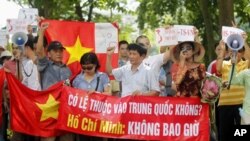Human rights observers have been busy in Vietnam over the past few weeks, with two political dissidents on trial, a large-scale land rights protest and arrests of other government critics. Some analysts say a new government crackdown is under way.
But there is still one ongoing protest that bucks the trend: demonstrations against China over territory in the South China Sea.
Sunday was the tenth anti-China protest in Hanoi. These gatherings started at the beginning of June after Vietnam complained that a Chinese patrol vessel had cut a cable trailing from a survey ship operating off Vietnam's coast.
Both Vietnam and China claim the islands, which are believed to be rich in oil and gas reserves.
It’s an emotional subject for many Vietnamese, and sparks fierce patriotism from the crowd. Ha, a computer programmer attending the protest, calls China’s actions an invasion of the Spratly and Paracel islands.
Ha says a recent Chinese military exercise near the Vietnam-China border threatens Vietnam’s territory. He says he came here to send a message to China that the Vietnamese people are not afraid and will fight to the last breath to protect their homeland.
Weeks ago, Vietnamese authorities broke up such protests after holding talks with China over the issue. But after videos of police arresting protesters appeared on the Internet, the arrests stopped.
Protesters
The demonstrators often include famous intellectuals and bloggers, many of whom have championed different issues across Vietnam, such as support for Catholic land rights or opposition to bauxite mines in Central Vietnam.
Economist Nguyen Quang A has taken part in most of the protests. He says they have united many people from different strands of Vietnamese society.
“You see all over in Vietnam there were a lot of demonstrations against the land issues and so on, that may be an economic problem. Here it is a bit different, it’s sovereignty,” he says.
Quang A was among 20 intellectuals and bloggers who sent a petition to the Ministry of Foreign Affairs asking for the negotiations between China and Vietnam to be made public.
“We don’t have enough information. The government of Vietnam also has its way of dealing with the problem, of facing reality. If they gave us more information, I think it would be much better. We respect the operation of the Vietnamese government but we, as citizens, would like to express our opinion,” Quang A says.
Government response
Professor Carl Thayer, from the University of South Wales in Australia, says one reason the anti-China protests have been allowed to continue is because they serve the government's purpose.
“As long as the protests are supportive of the regime, that’s fine, but once they become critical of the handling of the regime, then you are going to get a reaction," Thayer says. "Of course, that’s what the government is feeling: 'China, we have these issues with you.'"
Thayer says the Vietnamese government is still deciding how to resolve the issue with China. He says the lack of a clear policy on the protests suggests that the government is divided over the issue.
“One of my Vietnamese sources, it was a journalist, it was over a month ago, was talking about how divided the leadership was. He was arguing that the Party newspaper and the party theoretical journal had not given definitive guidance and this was proof that the party are divided on what to do,” says Thayer.
Catholic rally
On August 7 there was a very different protest in Vinh City, home to 750 Catholic parishes.
Media reports said about 3,000 people gathered in the Vinh diocese to rally against the government treatment of Catholics.
While some say the dispute is primarily over church land that the government wants, Catholic lawyer Le Quoc Quan says locals are taking a stand against broader religious repression.
“The government is trying to limit the rights of Catholic people. They try to ask the people to register their religion and for the Catholic students, they cannot go to the military university or the Security University," Le Quoc Quan says. "It’s difficult for them to apply for jobs and they will not be promoted. They are still regarded as the second class citizens.”
International reaction
The United States, European officials and international rights groups have condemned the arrests and said they contradict Vietnam’s public commitment to the Universal Declaration of Human Rights.
Nguyen Phuong Nga from the Ministry of Foreign Affairs rejected that criticism during a news conference with reporters. Nga insisted that issues with Catholics are related to land, not religion. She spoke through an interpreter.
“There’s one thing I can say about human rights in Vietnam, it is respected in Vietnam, it is written in the constitution and is observed in reality.”
While Vietnamese officials continue to strike a careful line on which protests they will tolerate and which remain taboo, observers such as Carl Thayer say the tolerance for anti-China protests are a key indicator of how the government talks are going with China.
“The Secretary general is due to go to China later in the year and I think we’ll see a regime attempt to quiet things down whenever that visit is scheduled," he says. "It’s like releasing the odd dissident trying to get something out of the U.S. government.”
While authorities arrest more dissidents who participate in forbidden protests, outside observers say the government is facing an uphill battle with public dissent because of a worsening economic outlook.
Vietnam has one of the world’s highest inflation rates and a double digit trade deficit, which is dampening growth and making consumer goods much more expensive.




